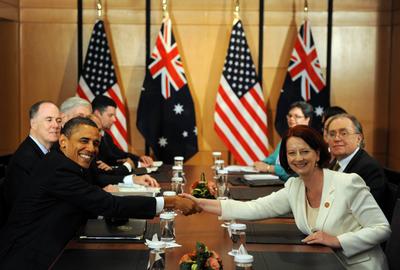Australia’s strong ties with Japan and South Korea are also the foundation for counsel and actions on North Korea’s proliferation and provocations.
Despite claims of US ‘decline’ and ‘neglect,’ a comprehensive and effective US re-engagement with the Asia Pacific has emerged over the past year. America relies on and coordinates closely with Australia on these initiatives; the two powers are working together to advance American engagement beneficial to both countries and the region as a whole.
The Obama administration’s diplomatic, security and economic initiatives represent the most important shift in regional dynamics in several years. They signal top priority American policy attention to the Asia Pacific region. President Obama reportedly has become convinced that the Asia Pacific is both of major importance to the United States and a world region where greater US engagement would be widely welcomed and beneficial for the United States and for the president’s standing at home and abroad.
The significance of the US initiatives has been overshadowed to some degree by China’s often ham-handed treatment of security issues, territorial disputes, maritime navigation rights and other sensitive issues with its Asian Pacific neighbors. Ironically, the Chinese actions have had the effect of reinforcing the importance of the American initiatives. Concerns over China’s actions and intentions have prompted Australia and other Asian Pacific countries to support and engage with the renewed US activism; the regional governments on the one hand position their countries to work positively with rising China in areas of common interests, while on the other hand they prepare for possible contingencies involving domineering Chinese assertiveness.
The stronger US engagement ranges across the entire Asia Pacific region. Firm US support for the security alliance with Japan helped Tokyo get its footing in the face of what was widely seen as Chinese ‘bullying’ over fishing disputes involving the Senkaku/Diaoyu Islands. The United States has steadily backed its South Korean ally as it sought support in the United Nations and in military exercises against North Korea’s aggression.
The US intervention at the ASEAN Regional Forum (ARF) meeting in July led a collective effort by involving Australia and other participants to defend free navigation and restore stability in the disputed South China Sea. The United States joined Australia in the East Asian Summit, raising the profile of that regional body over Asian-only regional groups. Prominent advances in US military and other relations with Vietnam came in August; President Obama held a summit meeting with ASEAN leaders in September, visited Indonesia, along with India, Japan and South Korea, in November and pledged to be at the 2011 East Asian Summit meeting in Jakarta. Meanwhile, US interaction with small Pacific Island states has been upgraded with annual meetings with the Secretary of State, and New Zealand has seen the most significant breakthrough in its relations with the United States since the rupture of the alliance over 20 years ago.
The Australian visitors will want an update on US engagement with Asia, especially the summit with China amid renewed Chinese reassurances and less truculent behavior coincident with President Hu Jintao’s successful visit. They will seek stronger American economic commitment in the region, assessing US follow-through on free trade initiatives with South Korea and the regional Trans Pacific Partnership that involves Australia and is forecast to reach a milestone agreement at the APEC meeting in Hawaii this year.
Overall, while there are sure to be some differences in the talks, the strongly converging Australian-American interests and actions forecast a remarkably close partnership in the years ahead.
Robert Sutter is Visiting Professor of Asian Studies at the School of Foreign Service at Georgetown University and Adjunct Professor of Asian Studies in the Elliott School of International Affairs at George Washington University.


Reading Robert Sutter’s viewpoints, I recognize the ‘decline’ and ‘neglect’ of theoretical framework in International Relations of the post-Cold War world among prominent American scholars.
Due to Sutter’s lack of the post-Cold War theoretical knowledge, he has failed to explain the phenomenon in its actuality. Inadvertently, Sutter continues to misdirect foreign policy decision makers as he writes from his own Cold War bias. Using the outdated Cold War model to guide policymaking can lead to adverse consequences as seen in the case of Kevin Rudd’s prime ministership.
It’s time we rise to the challenge becasue Asia and the Pacific cannot rely solely on the U.S. ‘decline’ and ‘neglect’ in theoretical knowledge of the post-Cold War world.